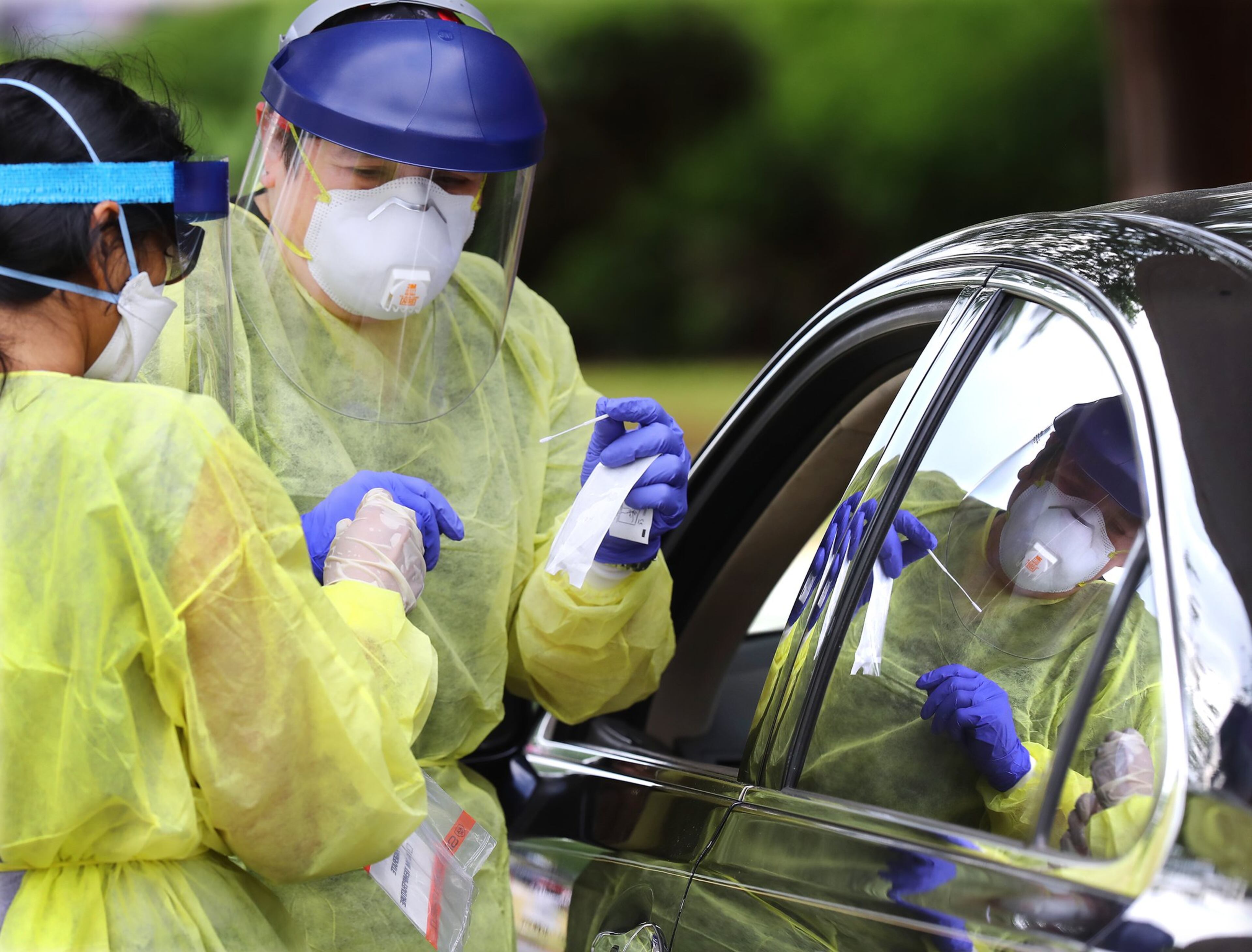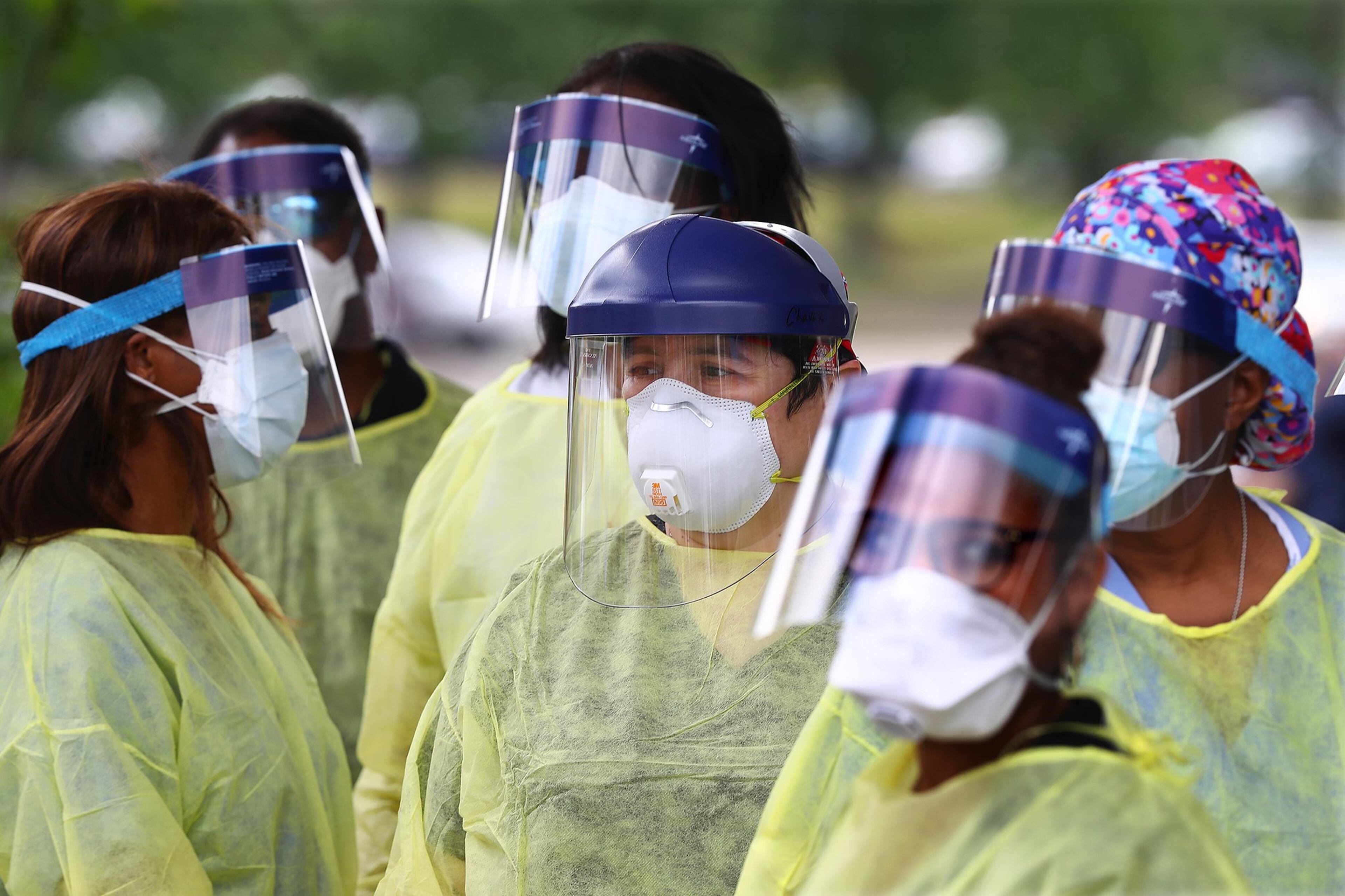Latest data lapse inflated Georgia’s virus test count by 57,000
After facing weeks of criticism for not being transparent with data about the coronavirus, state officials on Wednesday acknowledged that a test type that does not measure active cases inflated published test counts by 57,000, or roughly 14% of total tests to date.
For weeks now, the Department of Public Health has included antibody tests, which can detect if someone once had the coronavirus, with diagnostic tests that measure active infection in its total tally of about 403,000 tests.
Experts say it is misleading to count the tests together because it distorts a state’s capacity to track current infections.
» NEW DASHBOARD: The AJC's redesigned page of real-time charts tracking the virus
» COMPLETE COVERAGE: Coronavirus in Georgia
The department's inclusion of antibody tests in testing counts, first reported by the Ledger-Enquirer in Columbus, surprised DPH Commissioner Dr. Kathleen Toomey and prompted the governor's office to request that the department remove antibody tests from the state's totals. Toomey told the AJC she was unaware so many antibody tests were being included.
“It’s not really an error. It’s a way it was collected,” she said. “I didn’t fully appreciate how many antibody tests have been done.”
The testing admission is the latest in a series of missteps in how DPH has presented coronavirus data to the public, and it led to another round of harsh criticism for an agency that has been held up to national ridicule for its handling of public health information.
“Either they don’t know what they’re doing, or (the data is) being manipulated in ways it shouldn’t,” said Dr. Harry J. Heiman, a clinical associate professor at the Georgia State University School of Public Health. “Either way it is very concerning.”
» RELATED: Georgia playing catch up in coronavirus testing
» FROM APRIL: New changes to state's virus data confuse experts, residents alike
In April, Gov. Brian Kemp called the state's poor national ranking in its share of residents tested for the virus "unacceptable," and challenged public health officials and private companies ramp up the state's testing capacity. Earlier this week, he publicly touted the state's rise to 20th in the nation as an important step forward.
Removing antibody tests from the state’s testing total, however, now drops Georgia’s per capita ranking to 29th, according to the AJC’s analysis of national testing data.
Expert warnings
Experts warn states against lumping antibody and diagnostic virus tests together as they track how many tests have been completed. Diagnostic tests for the virus detect whether someone is currently ill. Tracking how many of them have been completed can show whether a state is doing enough to respond to the pandemic.
Tests for the antibody are designed to show whether a person was previously infected and miss people who recently contracted the virus, said Benjamin Lopman, an infectious disease epidemiologist at Emory University.
“It’s not appropriate to combine those numbers here,” said Lopman, an expert on using statistical analysis and other tools to address public health issues.

Last week, The COVID Tracking Project, a top source for national data, called combining antibody and viral testing figures a "deceptive misuse of the data." A controversy in Virginia led that state to announce last Thursday that it would remove the antibody figures from its overall testing number.
DPH spokeswoman Nancy Nydam said in an email that staffers are working on ways to disclose that both tests are included on its online COVID-19 Daily Status Report, and said that the agency had included the antibody tests in its counts in accordance with Centers for Disease Control and Prevention guidelines.
Toomey told the AJC she recognized her department’s handling of virus data has been a problem.
“Data are only good if you can look at them and understand what they mean,” she said. “As an epidemiologist this is something very important to me. We want to make sure we do everything we can to get these data in the most accurate but also easy to understand format.”
Earlier mistakes
This most recent data problem prompted demands for a transparent accounting of how and why the state has made so many unforced errors with COVID-19 data in recent weeks.
Some such as a death toll miscount could have been the result of typos. Others have repeatedly mislead Georgians to think new confirmed cases of the virus were dropping dramatically when they had plateaued.
While DPH has not been including positive antibody tests results in the total of confirmed cases, earlier this week the agency removed 231 positive cases from the state's tally of new confirmed cases, saying in a statement that it mistakenly included antibody test results in the count. Antibody tests only became available to the public in recent weeks and were not included in DPH's original test tracking totals.
"Either they don't know what they're doing, or (the data is) being manipulated in ways it shouldn't. Either way it is very concerning." —Dr. Harry J. Heiman, clinical associate professor at the GSU School of Public Health
The problems have led some to wonder whether bad information is being used to inform public policy.
Public health experts track closely a measure called positivity, which is the share of all tests for the virus that have come back positive. A high positivity rate may mean that a state is only testing the sickest people and does not have a good sense of the disease’s prevalence. A low one can mean a state knows enough to make informed decisions about reopening businesses, schools and swimming pools.
Johns Hopkins University’s Coronavirus Resource Center listed Georgia as among its top 20 states for positivity at 3.52%, but the inclusion of the antibody tests throw the state’s apparent successes into question.

Transparency
Recent mistakes have portrayed the state’s COVID response in a more positive light than it had earned, said State Sen. Jen Jordan, D-Atlanta.
"Maybe one mistake is an accident. A second — that's a little funny," Jordan said. "But after you get to the third or fourth time, with the mistakes representing a specific conclusion, you have to start to wonder what is happening in terms of management of data."
T.J. Muehleman, who helped start the COVID Mapping Project, an online tool to help bring clarity to confusing health data reported across the U.S., has been among those perplexed by Georgia’s data stumbles.
“The state that’s home to the CDC, Georgia Tech, Emory University and the Morehouse School of Medicine — how do you have such a terrible data communication platform?” Muehleman said.
» RELATED: State's latest data mishap causes critics to cry foul
But Muehleman said the state’s testing capacity appears to be moving in the right direction and he said he doesn’t believe the errors are deliberate.
“I suspect this is them moving at a very, very rapid clip to be responsive,” Muehleman said. “It is disappointing. All the data problems they have had have been avoidable and certainly all the data problems they have would be solved with transparency.”
J.C. Bradbury, an economics professor at Kennesaw State University who tracks the Department of Public Health data and publishes his own graphs on Twitter, said this latest data reporting controversy shows that the state needs oversight. He said DPH should invite the media to watch its number crunching operation much as elections offices do on election nights.
“It would go a long way to establish credibility,” he said.
Dr. Melanie Thompson, principal investigator of the AIDS Research Consortium of Atlanta and a practicing physician, said she grew suspicious of DPH’s testing figure after it pulled back the 231 positive tests earlier this week.
“The question I have is who made this decision?” she said. “Who made the decision to do this? I wish the Department of Public Health would let the (epidemiology) group talk.”
Staff writer Tamar Hallerman contributed to this report.



